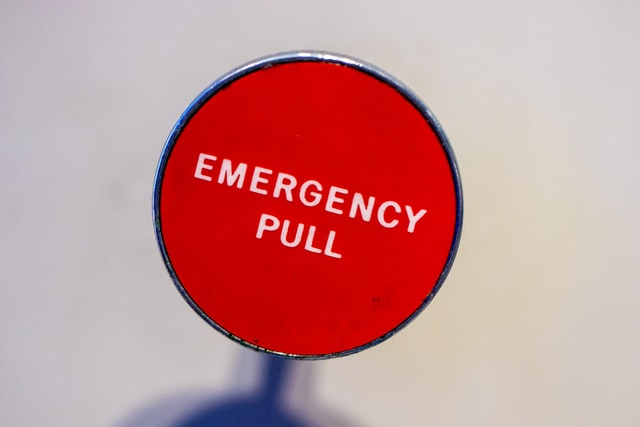Sh*t happens. Have an emergency fund.
Whether it's dislocating your shoulder while throwing axes at Tommy's birthday party or getting a flat tire from that one street that never gets paved, you're going to face some financial shocks. And when that happens, you don't want empty pockets. That's where the emergency fund comes in.
What is an Emergency Fund?
An Emergency Fund (EF) is a dedicated, liquid bank account that contains money for unexpected expenses. More traditionally, an EF is designed to protect you in case you lose your job. Nevertheless, the money should be quick and easy to withdrawal (i.e. liquid), you know, so you can pay for the emergency expense immediately. Therefore, consider using a savings account, especially an account that carries a higher interest rate (online banks such as Ally tend to provide higher rates, making them ideal candidates). But please, I'm begging you, don't put your Emergency Fund in Bitcoin. Or Ethereum or Ripple or Litecoin. Have no idea what I'm talking about? Good. Let's keep it that way.
Why it matters
Consider the below statistics from a Pew Charitable Trusts study (2015):
- There is a 60% chance that a household will experience a financial shock in any 12-month time period.
- More than 50% of households experienced financial struggles after their most costly emergency expense, and nearly 50% had not fully recovered after six months.
- Households that experienced a financial shock subsequently had lower savings and higher credit card debt than households that did not have a financial shock.
As the results of the study clearly show, an EF plays a large role in feeling financially safe, which represents one of the four pillars in which Moneyskope views an individual’s finances. And not feeling financially safe (i.e. the ability to cover unexpected expenses) can have a real, negative effect on your mental health and your overall financial well-being.
Moreover, not having an EF may force you to use credit cards to pay off the expense, placing you under more debt, or it may force you to rely on others such as family and friends. While getting help from those closest to you may seem like a good idea, it has the potential to cause problems with the relationships down the road.
How much should be in the EF?
Addressing the amount that should be in the EF is an art and a science. Ultimately, the amount depends on a number of factors such as the stability of your income, the number of kids you have, your health, and your personal level of comfort. As a blanket recommendation, the gurus suggest 3 to 6 months’ worth of expenses. However, Pew Charitable Trusts notes that the median household had the largest financial shock equal to half a month of income. Therefore, I view that as being a reasonable starting point. Keep in mind that the appropriate amount to place in your EF depends on your personal circumstances.
For those of you who feel safe knowing that you have a year’s worth of expenses, may I remind you that it’s entirely possible to have too much in your EF. Because you have extra cash sitting on the sidelines, your overall wealth is being hurt by cash drag. Said differently, the extra money could be invested in a diversified portfolio earning a return above inflation rather than earning the paltry rate that the bank gives you (even if it is high-yield).
Does the EF really need to be in a separate account?
Yes.
A few days ago, my brother and I debated this very question when I showed him his customized Wealth Report. Ever the perfectionist, he was pretty unhappy when he noticed that his Wealth Score was negatively affected (by only a point or two) because he didn't have a separate account for his Emergency Fund. What's the big deal?
It comes down to being organized and knowing what you have. Because the Emergency Fund serves as lifeline, it's even more important that you know exactly where you stand (vs. a vacation fund in which the consequences of not knowing how much money you have aren't nearly as grave). A separate bank account gives you the opportunity to do just that. So when you need to get your hot water heater replaced, you'll know exactly how much you have to cover the cost.
Disclosures: I use Ally for my Emergency Fund; however, Moneyskope is not associated with Ally nor does it receive compensation for promoting Ally.
References
Pew Charitable Trusts, 2015. How Do Families Cope With Financial Shocks? October; available at www.pewtrusts.org/~/media/assets/2015/10/emergency-savings-report-1_artfinal.pdf.


